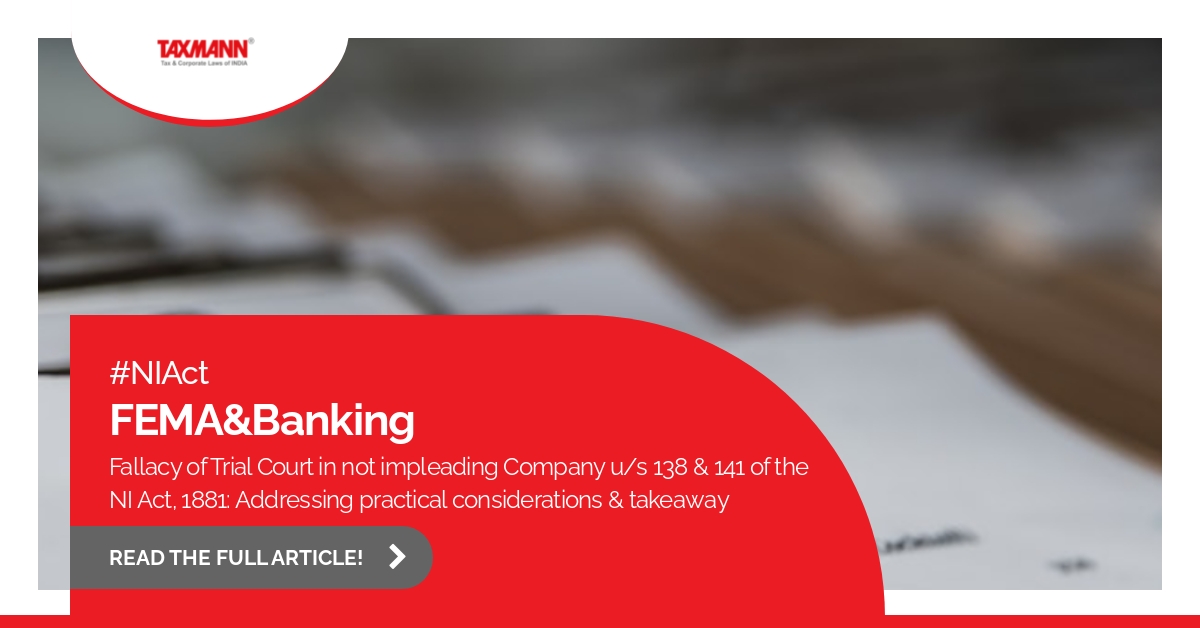Fallacy of Trial Court in not impleading Company u/s 138 & 141 of the NI Act, 1881: Addressing practical considerations & takeaways
- Blog|News|FEMA & Banking|
- 2 Min Read
- By Taxmann
- |
- Last Updated on 11 March, 2022

[2022] 136 taxmann.com 125 (Article)
Introduction
Dishonour of cheques has now become a perennial issue that has led to docket explosion due to prolonged trials and perhaps inefficiency in timely disposal of the cases. In the recent past, cases involving the dishonour of cheques were observed to be languishing before the subordinate courts that even prompted the Hon’ble Supreme Court of India (“Supreme Court”) to take suo motu cognizance of the prolonged and never-ending trials of cases filed under Section 138 of the Negotiable Instruments Act, 1881 (“the Act”)1. Whilst there are multiple grey areas that still require an authoritative decision from the apex court, the present article endeavors to shed light on a pressing issue i.e., the incoherent error committed by a learned trial court by selectively issuing summons to the authorized signatory of the cheque, without summoning the company on whose behalf the cheque was issued.
To illustrate in simpler terms, while taking cognizance of the complainant for dishonor of cheque issued on companies’ behalf, if a trial court solely summons the signatory of the cheque and not the company and its directors in-charge as arrayed in the complaint, that creates an untoward legal anomaly, disadvantageous to the innocuous complainant. An illogical approach of issuing summons to the signatory of the cheque, but not the company on whose behalf the cheque was issued, negates the scheme of the Act, jeopardizing the legitimate claims of the complainant and prejudicial to its right.
In cases of not arraying the Company as a respondent in a complaint filed for dishonour of the cheque issued on behalf of the Company, the Supreme Court in Aneeta Hada v. Godfather Travels & Tours (P.) Ltd.2, observed it to be a vital and substantial error, enabling ground for quashing of the complaint under Section 482 of the Code of Criminal Procedure, 1973 (“CrPC”).
In view of the above background, the purported research question arises in cases where the company is arrayed as an accused along with other necessary parties i.e. signatory of cheque and director(s), however, the summons is exclusively issued to the signatory of the cheque but not to the company. Not issuing summons to the company by the Ld. Trial Court is an error which is fatal in nature for quashing complaint in its entirety or is it an error that can be rectified at the stage of trial is the moot proposition that warrants an answer.
Click Here To Read The Complete Article
Disclaimer: The content/information published on the website is only for general information of the user and shall not be construed as legal advice. While the Taxmann has exercised reasonable efforts to ensure the veracity of information/content published, Taxmann shall be under no liability in any manner whatsoever for incorrect information, if any.

Taxmann Publications has a dedicated in-house Research & Editorial Team. This team consists of a team of Chartered Accountants, Company Secretaries, and Lawyers. This team works under the guidance and supervision of editor-in-chief Mr Rakesh Bhargava.
The Research and Editorial Team is responsible for developing reliable and accurate content for the readers. The team follows the six-sigma approach to achieve the benchmark of zero error in its publications and research platforms. The team ensures that the following publication guidelines are thoroughly followed while developing the content:
- The statutory material is obtained only from the authorized and reliable sources
- All the latest developments in the judicial and legislative fields are covered
- Prepare the analytical write-ups on current, controversial, and important issues to help the readers to understand the concept and its implications
- Every content published by Taxmann is complete, accurate and lucid
- All evidence-based statements are supported with proper reference to Section, Circular No., Notification No. or citations
- The golden rules of grammar, style and consistency are thoroughly followed
- Font and size that’s easy to read and remain consistent across all imprint and digital publications are applied



 CA | CS | CMA
CA | CS | CMA
